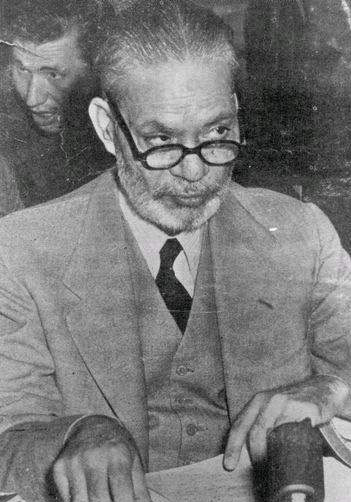“Good government can be no substitute for self-government.”
Proceedings of the 8th session of the UN General Assembly, 1953 http://www.dfait-maeci.gc.ca/department/history-histoire/dcer/details-en.asp?intRefid=1940
Chaudhry Sir Muhammad Zafarullah Khan was a Pakistani jurist and diplomat who served as the first Foreign Minister of Pakistan and the first Asian and the only Pakistani to preside over the UN General Assembly and the International Court of Justice.Born in Sialkot, British India, Khan was educated as a lawyer at the GC University and the King's College London. Khan went on to serve as a member of Punjab Legislative Council between 1926 and 1931, and was a delegate in 1930, 1931, and 1932 to the Round Table Conferences on Indian reforms in London, England. He became a member of the All-India Muslim League which led the Pakistan movement and served as the league's president between 1931 and 1932. In 1935, he became the Minister of Railway of British India, and sat on the British Viceroy's Executive Council as its Muslim member from 1935 to 1941. In 1939 he travelled to Geneva to represent India at the League of Nations and in 1942 became the Agent-General of British India to China. In September 1941, Khan became a judge on the Federal Court of India and remained on the court until the partition of India.
Khan became one of the most vocal proponents of Pakistan and led the case for the separate nation in the Radcliffe Commission which drew the countries of modern-day South Asia. He moved to Karachi in August 1947 and became a member of Pakistan's first cabinet serving as the country's debut foreign minister under the Liaquat administration. He remained Pakistan's top diplomat until 1954 when he left to serve on the International Court of Justice and remained on the court as a judge until 1958 when he became the court's vice president. He left the Hague in 1961 to become the Permanent Representative of Pakistan to the United Nations, a position he served until 1964.During his time at the UN, he also represented the State of Palestine in a de facto capacity. He left the UN in 1964 to return to the ICJ and, in 1970, he became the first and only Pakistani to serve as the President of the International Court of Justice, a position he maintained until 1973. He returned to Pakistan and retired in Lahore where he died in 1985 at the age of 92. Khan is considered as one of the leading founding fathers of Pakistan and a prominent member of the Ahmadiyya Community in Pakistan. He authored several books on Islam both in Urdu and English.

“Good government can be no substitute for self-government.”
Proceedings of the 8th session of the UN General Assembly, 1953 http://www.dfait-maeci.gc.ca/department/history-histoire/dcer/details-en.asp?intRefid=1940